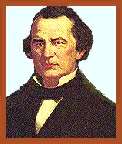| PinkMonkey Study Guide - American History
CHAPTER 6 : THE RECONSTRUCTION
6.0 Chronology of Major Events in this Period
1866 - Civil Rights Bill passed over
the Presidentís veto; Congress approves 14th
Amendment; Ku Klux Klan formed.
1867 - Congress Passes Military Reconstruction Act over Presidentís Veto.
1868 - Former Confederate states hold Constitutional
conventions, where former slaves are allowed to
vote; President Johnson is impeached; Escapes conviction
by one vote.
1870 -í77 - Southern Whites gradually recover control; the era of Radical Reconstruction comes to an end when President Hayes orders withdrawal of troops From the South.
The period after the bloody Civil War, along with the process by which the states of the confederacy would be readmitted to the Union is referred to as the Period of Reconstruction. This period was marked by struggle between political parties about how the Reconstruction program ought to be implemented.

Exhibit 6.1
Andrew Johnson
After Lincolnís tragic assassination, President Andrew Johnson took on the responsibility of Reconstruction. Johnson adopted the Wade Davis Plan. Under this plan, he issued amnesty to everyone who was ready to join the Union. The defeated ex-Confederates signed the oaths. Johnson further demanded that the rebel states -
i) ratify the 13th amendment freeing slaves,
ii) abolish slavery as a practice, and
iii) declare the secession null and void.
Johnsonís attempt to assume primary responsibility for Reconstruction after Lincolnís death alienated the Congress while his leniency toward the South increasingly angered Northern voters. By the end of the year 1865, all secessionist states except Texas consented to the demands.
The Congress remained unsatisfied stating that the Wade Davis Plan returned power to the same people who had tried to break the Union. The Republican members in the Congress were unhappy with it. It also pointed out that the Program had no provision to protect the free slaves. Moreover, the southern states were passing black codes to suppress the former slaves.
Thus, the Freedmanís Bureau Act was passed. This act was intended to help former slaves to shift from slavery to emancipation and assured them equality before law. This act was passed over the Presidentís veto. Johnson believed that the southern states had the right to send delegates to the Congress. The Congress refused to recognize the right.
[Next Page]
|